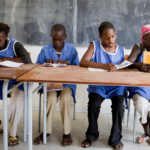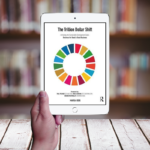In 2021, we published 23 posts contributed by 22 authors on R&E Search for Evidence. Readers from 192 countries visited the blog to learn about research on topics that included HIV prevention, mental health, economic strengthening, reproductive health, and sanitation and hygiene. Here, I feature some of our most-read posts as well as those that generated interest on social media.
Most popular posts
The COVID-19 pandemic has brought increased attention to social and emotional health, especially in children, and readers flocked to a post by Fernanda Soares and Alejandra de Freitas on incorporating social and emotional learning into teacher education. The post is listed as a resource on the EducationLinks website of the United States Agency for International Development.
A popular post by Caroline Harik aligned with growing interest in decolonizing global health. She wrote about studies related to the incorporation of traditional healers into the primary health care system, and noted that while traditional healers are effective at counseling and referring patients, medical professionals sometimes are not open to working with them.
Finally, Amy Detgen’s post connected with U.S. conversations about equity in education and how to improve access to higher education for students regardless of income. Her team’s qualitative study looked at the importance of relationships for first-generation college students. Detgen and her colleagues found that a college and career readiness program helped students connect to careers, build confidence, and develop long-term friendships.
Top posts by country
Philippines
United Kingdom
Many UK readers read Annette Brown’s rapid evidence review on changing social norms around intimate partner violence and gender-based violence. Because of the heterogeneity of programs and the mix of outcomes, she recommends that program designers look at evidence that closely matches their context rather than relying on general findings.
India and Kenya
India and Kenya were third and fourth, respectively, among our global readers. Both audiences were drawn to a post about water, sanitation and hygiene (WASH) practices in health care facilities. The post by Aarin Palomares and Lily McCann explains how the World Health Organization and UNICEF monitor WASH practices and progress across the world.
Nigeria
Readers in Nigeria were interested in new options for contraception for women living with HIV. In this popular post, Katy Todd describes a study she and her colleagues conducted on whether women using a hormonal long-acting reversible contraceptive were more likely to transmit HIV to their partners. The authors found no significant increase in detectible HIV in the genital tract and explained how this research may inform future family planning.
Abuzz on social media
I tweet daily about R&E Search for Evidence posts and FHI 360 research publications on @fhi360research, and our book review posts generated a lot of interest among social media users this year.
The book review of Quality of Tuberculosis Care by Robert Makombe and Hind Satti sparked the most interest on Twitter. The post discusses the urgency of shifting from a focus on quantity of care to quality of care because providing care of questionable quality is unethical and ineffective at eliminating TB. Makombe and Satti write about centering the needs of TB clients and engaging the private sector.
Ebele Monye drew plenty of Twitter activity with her book review of How the other half banks: Exclusion, exploitation and the threat to democracy. Monye walks us through the history of exclusion in the U.S. banking system and efforts to increase access to financial services and concludes with her own ideas on how regulations and digital finance could reduce inequities.
Not a book review, but still a social media star, was Matthew Eady’s post summarizing product development research he published with colleagues. He describes the development and testing of a handheld tool for screening medications. Though laboratories typically use large, expensive spectrometers, Eady and his colleagues find that small, low-cost spectrometers are effective at testing the quality of medications, making them a good option for field use.
Looking forward to 2022
We’ve now published more than 200 posts sharing the knowledge that our researchers have gleaned from their work. I hope you’ll take time to catch up on posts that you’ve missed. Happy new year!
The Evidence Unit of FHI 360’s Chief Science Office produces R&E Search for Evidence. Annette Brown serves as Editor-in-Chief and Sarah Muthler serves as Interim Managing Editor.
Photo credit: Pixabay



